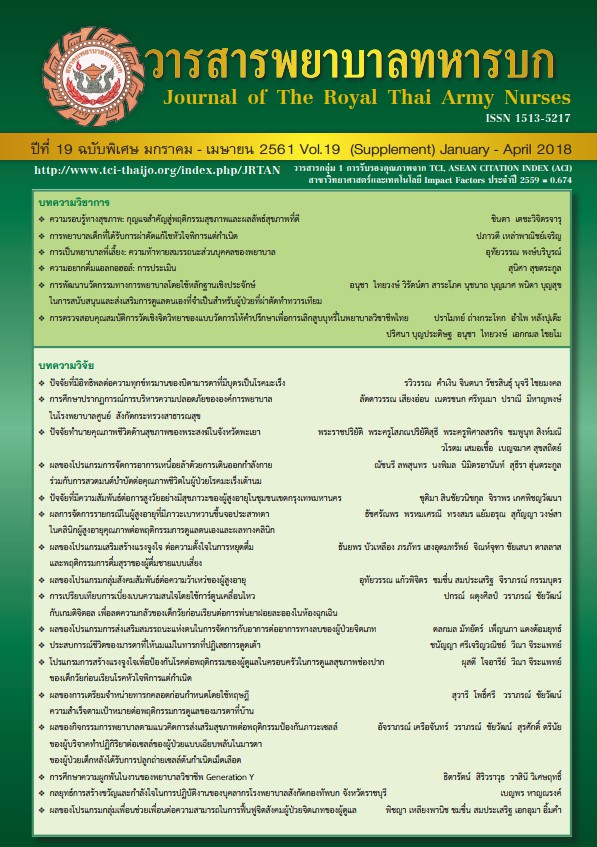The Effect of Discharge Planning Based on Theory of Goal Attainment on Caring Behavior at Home
Keywords:
discharge planning program for preterm infants, theory of goal attainment, caring behavior of mothers of preterm infants at homeAbstract
The purpose of this quasi-experimental research was to study the effect of discharge planning based on theory of goal attainment on caring behavior at home. Forty mothers of preterm infants hospitalized at Thammasat University Hospital were assigned to the experimental and control group based on the sequence of hospitalization. The first 20 mothers were assigned to the control group. Another 20 mothers paired by their education level with those in the control group were assigned to the experimental group. The control group received routine nursing care, while the experimental group received discharge planning based on theory of goal attainment. The intervention consisted of 6 steps: 1) interaction 2) assessment to identify problems and disturbance 3) mutual goals setting 4) explore the means to achieve goal 5) Agree to means to implement the goal and 6) transaction. Mothers’ caring behavior for preterm infants at home was measured by preterm infants caring behavior of mother questionnaire. This instrument demonstrated acceptable content validity index (.94) and Cronbach’s alpha coefficient (.89). Data were analyzed using descriptive statistics and independent t-test. Mothers receiving discharge planning program based on theory of goal attainment were found to perform better caring behavior for preterm infants at home than mothers receiving the routine nursing care, at the statistical significance level of .05.
Downloads
References
2. Apichutboonchok S. Parents’ participation on their preterm development support in Neonatal Intensive Care Unit. Vajira Medical Journal 2013; 57(1): 65-72. (in Thai)
3. Aagaard H, Hall EO. Mothers’ experiences of having a preterm infant in the neonatal care unit: a meta-synthesis. Journal of Pediatric Nursing 2008; 23(3): e26-36.
4. Kunsiri S. Developing the empowerment program for mothers of premature infants [IS]. Rangsit, Pathumthani: Thammasat University; 2005. (in Thai)
5. Young PC, Korgenski K, Buchi KF. Early readmission of newborns in a large health care system. Journal of American Academy of Pediatrics
2013; 131(5): 1538-1544.
6. Underwood MA, Danielsen B. Gilbert WM. Cost, causes and rates of rehospitalization of preterm infants. Journal of Perinatology 2007; 27: 614-619.
7. Lee JH, Kim JM, Kim YD, Lee SM, Song ES, Ahn SY, et al. The readmission of preterm infants of 30-33 weeks gestational age within 1 year following discharge from Neonatal Intensive Care Unit in Korea. Neonatal Medicine 2014; 21(4): 224-232.
8. Pezzati M. Hospital readmissions in late preterm infants. Italian Journal of Pediatrics 2014; 40(2): 29.
9. Drake E. Discharge teaching needs of parents in the NICU. Neonatal Network 1995; 14: 49-53.
10. Sheikh, L., O’Brien, M., and McCluskey-Fawcett, K. Parent preparation for the NICU-to-home transition: staff and parent perceptions. Children’s Health Care 1993; 22: 227-239.
11. Wongphinit, U., Sisuksai, N., and Yusamran. Personal factor, social support and effective sucking at discharge in predicting exclusive breastfeeding at one month among first-time mothers. Journal of The Royal Thai Army Nurses. 2016; 17(1) : 88-95. (in Thai)
12. Bakewell-Sachs, S., and Blackburn, S. Parenting the Post-NICU Premature Infant. Journal of Obstetric, Gynecologic and Neonatal Nursing (2003); 29(6): 398-695.
13. Dossey, B.M., and Keegan, L. Holistic nursing: a handbook for practice. 5th ed. Sudbury: Jones and Bartlett Publishers, 2008.
14. Sundeen, S.J., Stuart, G.W., Rankin, E.A.D., and Cohen, S.A. Nurse-client interaction: implementating the nursing process. 6th ed. St. Louis: Mosby, 1998.
15. Thumikaborworn S. Holistic nursing: case studies. Bangkok: Thana Press; 2011. (in Thai)
16. Hanuchareonkul S. Nursing: the science of practice. 1st ed. Bangkok: V.J. Printing; 2000. (in Thai)
17. King IM. The theory for nursing. New York: Wiley Medical Publication, 1981.
18. Limniyomtham S. Effects of preterm infants’ discharge planning based on theory of goal attainment on anxiety and caring behavior of mothers [Dissertation]. Pathumwan, Bangkok: Chulalongkorn University; 2003. (in Thai)
19. Sakdajiwacharoan V. The effect of discharge planning program on premature infant care behavior of mothers [Dissertation]. Pathumwan, Bangkok: hulalongkorn University; 2010. (in Thai)
20. Phumket W. The effect of the perceived selfefficacy promoting program by coaching on premature infants caring behaviors of firsttime adolescent mothers [Dissertation]. Pathumwan, Bangkok: Chulalongkorn University; 2008. (in Thai)
21. Moore, M.L. Realities in child bearing. 2nd ed. Philadephia: W.B. Saunders; 1983.
22. Suwannapong D, Pinyokham N, Chaiyarj S. Effect of nursing care based on theory of goal attaint on pulmonary disease. Nursing Journal 2009; 36(3): 114-124. (in Thai)
23. Charungsaksakul P. Case study: using King’s nursing theory in children with conduct disorder and bipolar disorder. In: the 8th Annual International Mental Health Conference; 26-28 August. Thailand: Bangkok; 2009. (in Thai)
24. Saikaew N, Sopajaree C. Effect of nursing care using goal attainment theory on anemia preventive behaviors in pregnant women. Journal of Nursing Science Chulalongkorn University 2007; 19(2): 17-29. (in Thai)
Downloads
Published
How to Cite
Issue
Section
License
บทความหรือข้อคิดเห็นใดใดที่ปรากฏในวารสารพยาบาลทหารบกเป็นวรรณกรรมของผู้เขียน ซึ่งบรรณาธิการหรือสมาคมพยาบาลทหารบก ไม่จำเป็นต้องเห็นด้วย
บทความที่ได้รับการตีพิมพ์เป็นลิขสิทธิ์ของวารสารพยาบาลทหารบก
The ideas and opinions expressed in the Journal of The Royal Thai Army Nurses are those of the authors and not necessarily those
of the editor or Royal Thai Army Nurses Association.






